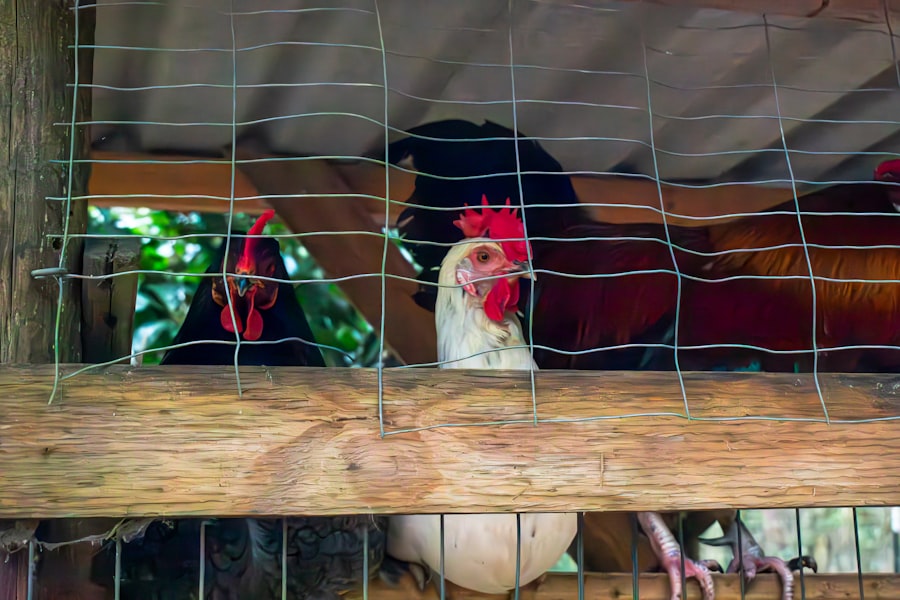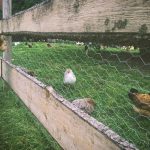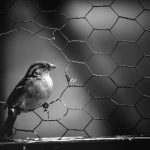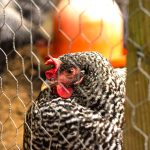Chickens are social creatures that benefit from a structured environment. They establish a hierarchical system within their flock, known as a pecking order. Understanding this behavior is essential for maintaining a harmonious chicken coop.
Adequate space is necessary to allow chickens to establish their pecking order without overcrowding, which can lead to aggressive behavior and stress. Chickens possess natural curiosity and enjoy exploring their surroundings. They have a strong instinct to forage for food, making it important to provide opportunities for scratching and pecking at the ground, which contributes to their overall well-being.
These birds are sensitive to environmental changes and can experience stress easily. Factors such as loud noises, sudden movements, and overcrowding can cause stress in chickens, potentially resulting in decreased egg production and compromised health. Creating a calm and peaceful environment with minimal disruptions is crucial for chicken welfare.
By understanding and accommodating their natural behaviors, chicken owners can promote the health and happiness of their flock.
Table of Contents
- 1 Creating a Chicken-Friendly Space
- 2 Providing Adequate Enrichment
- 3 Implementing Proper Fencing
- 4 Utilizing Natural Deterrents
- 5 Establishing a Regular Maintenance Routine
- 6 Seeking Professional Help if Necessary
- 7 FAQs
- 7.1 What are some effective ways to keep chickens from ruining your yard?
- 7.2 How can I protect my garden from chickens?
- 7.3 What are some natural deterrents for keeping chickens out of certain areas?
- 7.4 How can I prevent chickens from digging up my lawn?
- 7.5 What are some important considerations for keeping chickens in a backyard setting?
Key Takeaways
- Chickens are social animals and have a natural pecking order within their flock
- Providing a spacious and safe environment is crucial for chicken well-being
- Enrichment activities such as dust baths and perches are essential for chicken mental and physical health
- Proper fencing is necessary to keep chickens safe from predators
- Natural deterrents such as predator-proofing the coop and using motion-activated lights can help keep chickens safe
- Regular maintenance of the coop and surrounding area is important for chicken health
- Seeking professional help from a veterinarian or animal behaviorist can be beneficial for addressing any chicken behavior issues
Creating a Chicken-Friendly Space
Providing the Right Space
Creating a chicken-friendly space involves providing the right environment for your chickens to thrive. This includes ensuring that they have enough space to roam and forage, as well as providing shelter from the elements. A well-ventilated coop with plenty of natural light is essential for the health and well-being of your chickens.
Meeting Their Needs
Additionally, it’s important to provide roosting bars and nesting boxes for your chickens to feel safe and secure. In addition to the physical space, it’s important to consider the layout of the chicken coop and run. Providing areas for dust bathing, perching, and hiding will allow your chickens to exhibit their natural behaviors.
Promoting Health and Happiness
It’s also important to provide access to fresh water and a balanced diet to ensure that your chickens are healthy and happy. By creating a chicken-friendly space, you can promote natural behaviors and reduce stress in your flock.
Providing Adequate Enrichment

Chickens are intelligent animals that require mental stimulation to prevent boredom and stress. Providing adequate enrichment in the form of toys, treats, and activities can help keep your chickens engaged and happy. Scatter feeding, where you spread their food around the coop or run, encourages natural foraging behavior and keeps them active.
Additionally, hanging treats such as cabbage or corn on a string can provide entertainment and mental stimulation for your chickens. Furthermore, providing objects for pecking and scratching, such as logs or straw bales, can help satisfy their natural instincts. Rotating toys and activities regularly can prevent boredom and keep your chickens engaged.
It’s important to observe your flock and tailor enrichment activities to their preferences. By providing adequate enrichment, you can ensure that your chickens are mentally stimulated and content.
Implementing Proper Fencing
Proper fencing is essential for keeping your chickens safe from predators and preventing them from wandering into unwanted areas. A secure fence that is buried at least a foot into the ground can prevent predators from digging underneath and gaining access to your flock. Additionally, using hardware cloth with small openings can prevent predators from reaching through the fence to grab your chickens.
It’s also important to consider the height of the fence, as some predators can jump or climb over low barriers. A fence that is at least six feet tall can help deter predators from entering the chicken coop or run. Regularly inspecting the fence for any signs of wear or damage is crucial for maintaining its effectiveness.
By implementing proper fencing, you can ensure the safety and security of your flock.
Utilizing Natural Deterrents
In addition to proper fencing, utilizing natural deterrents can help keep predators away from your chickens. Planting thorny bushes or shrubs around the perimeter of the coop or run can create a natural barrier that deters predators from approaching. Additionally, using motion-activated lights or sprinklers can startle predators and discourage them from coming near the chicken coop.
Furthermore, introducing predator species such as dogs or geese can help keep predators at bay. These animals can serve as natural protectors for your flock, deterring potential threats from entering the area. It’s important to research natural deterrents that are effective in your specific area and climate.
By utilizing natural deterrents, you can create an additional layer of protection for your chickens.
Establishing a Regular Maintenance Routine

Cleaning the Coop and Run
This includes regularly cleaning out the coop, removing soiled bedding, and replacing it with fresh material. Additionally, regularly inspecting the coop for any signs of wear or damage can help prevent potential issues from arising.
Maintaining Clean Water and Food Sources
It’s also important to maintain clean water and food sources for your chickens, as well as regularly checking for any signs of illness or injury in your flock.
Preventing Predator Hiding Spots
Keeping the area around the coop and run free of debris and overgrown vegetation can also help prevent potential hiding spots for predators. By establishing a regular maintenance routine, you can ensure that your chickens are living in a clean and safe environment.
Seeking Professional Help if Necessary
If you encounter any issues with your chickens that you are unable to resolve on your own, it’s important to seek professional help. This may include consulting with a veterinarian who specializes in poultry health or seeking advice from experienced chicken keepers in your area. Additionally, if you are experiencing persistent predator problems despite implementing deterrents, it may be necessary to consult with a wildlife expert or pest control professional.
Furthermore, if you are considering making significant changes to your chicken coop or run, such as expanding the space or adding new features, seeking professional advice can help ensure that you are making the best decisions for your flock. By seeking professional help when necessary, you can ensure that you are providing the best care for your chickens and addressing any issues effectively. In conclusion, understanding chicken behavior is crucial for creating a harmonious environment for your flock.
By providing a chicken-friendly space with adequate enrichment, proper fencing, and natural deterrents, you can ensure the safety and well-being of your chickens. Establishing a regular maintenance routine and seeking professional help when necessary can help address any issues that may arise. By prioritizing the needs of your chickens and accommodating their natural behaviors, you can create a happy and healthy environment for your flock to thrive.
If you’re looking for tips on how to keep chickens from ruining your yard, you might also be interested in learning how to care for goslings. Check out this article for helpful information on raising and caring for geese.
FAQs
What are some effective ways to keep chickens from ruining your yard?
Some effective ways to keep chickens from ruining your yard include providing them with a designated area for dust bathing, using fencing to create boundaries, and providing them with plenty of enrichment and activities to keep them occupied.
How can I protect my garden from chickens?
You can protect your garden from chickens by using fencing, raised beds, and chicken-proof barriers such as netting or cloches. Additionally, providing the chickens with their own designated area for foraging and scratching can help divert their attention away from your garden.
What are some natural deterrents for keeping chickens out of certain areas?
Some natural deterrents for keeping chickens out of certain areas include using citrus peels, coffee grounds, or vinegar around the perimeter of the area you want to protect. Chickens tend to avoid these scents and will be less likely to venture into those areas.
How can I prevent chickens from digging up my lawn?
You can prevent chickens from digging up your lawn by providing them with a designated area for dust bathing and scratching, as well as ensuring they have plenty of space and enrichment to keep them occupied. Additionally, using fencing or barriers to create boundaries can help prevent them from accessing certain areas of the lawn.
What are some important considerations for keeping chickens in a backyard setting?
Some important considerations for keeping chickens in a backyard setting include providing them with adequate space, shelter, and enrichment, as well as ensuring they have access to fresh water and a balanced diet. It’s also important to be mindful of local regulations and ordinances regarding keeping chickens in a residential area.
Meet Walter, the feathered-friend fanatic of Florida! Nestled in the sunshine state, Walter struts through life with his feathered companions, clucking his way to happiness. With a coop that’s fancier than a five-star hotel, he’s the Don Juan of the chicken world. When he’s not teaching his hens to do the cha-cha, you’ll find him in a heated debate with his prized rooster, Sir Clucks-a-Lot. Walter’s poultry passion is no yolk; he’s the sunny-side-up guy you never knew you needed in your flock of friends!







